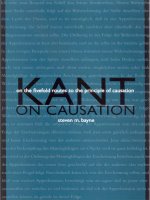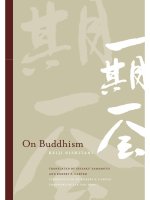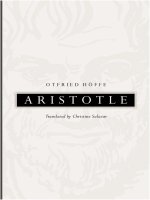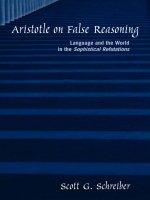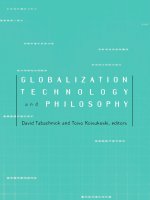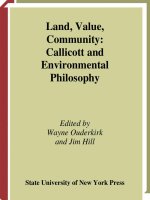state university of new york press the gathering of reason may 2005
Bạn đang xem bản rút gọn của tài liệu. Xem và tải ngay bản đầy đủ của tài liệu tại đây (867.33 KB, 217 trang )
John Sallis
John Sallis
The
Gathering of
Reason
Second Edition
The
Gathering of
Reason
Second Edition
The Gathering
of REASON
suny series in
contemporary continental philosophy
DENNIS J. SCHMIDT, EDITOR
The Gathering
of REASON
Second Edition
JOHN SALLIS
state University of new york press
Published by
STATE UNIVERSITY OF NEW YORK PRESS
ALBANY
2005
©1980 by John Sallis
All rights reserved
Printed in the United States of America
No part of this book may be used or reproduced in any manner whatsoever
without written
permission. No part of this book may be stored in a
retrieval system or transmitted in any form or by
any means including
electronic, electrostatic,
magnetic tape, mechanical, photocopying,
recording
, or otherwise without the prior permission in writing of the
publisher.
For information, address
State University of New York Press
194 Washington Avenue, Suite 305, Albany, NY 12210-2365
Production and book design, Laurie Searl
Marketing, Michael Campochiaro
Library of Congress Cataloging-in-Publication Data
Sallis, John, 1938–
The gathering of reason / John Sallis. — Sec. ed.
p. cm. — (SUNY series in contemporary continental philosophy)
Includes bibliographical references and index.
ISBN 0-7914-6453-9 (hardcover : alk. paper) — ISBN 0-7914-6454-7
(pbk. : alk. paper)
1. Kant, Immanuel, 1724–1804. Kritik der reinen Vernunft. 2. Knowledge,
Theory of. 3. Reason. 4. Imagination. 5. Dialectic. 6. Transcendentalism.
I. Title. II. Series.
B2779.S25 2005
121—dc22 2004022718
10 9 8 7 6 5 4 3 2 1
for Lauren and Kathryn
This page intentionally left blank.
“C’est l’imagination qui étend pour nous la mesure des
possibles soit en bien soit en mal, et qui par consequent
excite et nourrit les desirs par l’espoir de les satisfaire.”
J J. R
OUSSEAU, Émile
This page intentionally left blank.
Contents
Preface to the First Edition xi
Preface to the Second Edition xiii
Introduction 1
Chapter I
INTERPRETIVE HORIZONS 13
1. The Problem of Metaphysics
2. Gathering
3. Modes of Gathering
Chapter II
THE TRANSCENDENTAL DIALECTIC 39
1. Transcendental Illusion
2. Reason
3. Ideas
4. Derivation of the Ideas
Chapter III
THE GATHERING OF REASON IN THE PARALOGISMS 63
1. Paralogism in General
(a) The Issues of Paralogism
(b) Transcendental Apperception
(c) Transcendental Paralogism
ix
x THE GATHERING OF REASON
2. The Four Paralogisms
(a) Substantiality
(b) Simplicity
(c) Personality
(d) Ideality
3. Projective Interpretation of the Paralogisms
Chapter IV
THE GATHERING OF REASON IN THE ANTINOMIES 97
1. The Cosmological Ideas
2. The Four Antinomies
3. The Interest of Reason
4. The Critical Solution of the Antinomies
5. The Regulative Employment of Reason
6. Freedom and Necessity
7. Projective Interpretation of the Antinomies
Chapter V
THE GATHERING OF REASON IN THE IDEAL 125
1. The Transcendental Ideal
2. The Existence of God
3. Projective Interpretation of the Ideal
Chapter VI
REASON, IMAGINATION, MADNESS 143
1. Inversion
2. Imagination
3. Imagination and Dialectical Illusion
Chapter VII
METAPHYSICAL SECURITY AND THE PLAY OF
IMAGINATION 157
1. The Play of Absence
2. The Play of Critical Metaphysics
3. The Play of Imagination
Afterword to the Second Edition: Kant and the Greeks 171
Notes
181
Index 195
Preface to the First edition
In this text I trace a way to the issue of imagination. It is intended to be
a way around that closure of the issue, which, in play throughout
the history of metaphysics, now obtrudes in the utter conflation of the
difference that once separated imagination from fancy and in the
allied displacement of them, indistinguishably, into an innocuous self-
entertaining activity of conjuring up mental images. Radical measures
are required in order to elude that closure: They must be capable of
measuring out to imagination a space in which the traditional concep-
tual oppositions predetermining it can be thrown out of joint, infused
with indeterminacy, anarchy.
The particular way traced runs through reason, through the problem
of reason (in its Kantian form), which coincides with the problem of
metaphysics. Or rather, it is a matter of treading carefully along the edge
of a certain deforming of reason—a phenomenon which, at a different
level and in that unconditioned form manifest today, might well be called
“nihilism.” At certain decisive turns on this way I shall also allude to
certain other elements belonging to the relevant conceptual configura-
tion, e.g., the oppositions between reason and experience and between
reason and madness; and I shall take some steps toward transposing
them in a direction that gives space to the issue of imagination, e.g., that
of the oppositions between presence and absence and between self-
possessed positing and self-dispossessed ecstasy.
In a sense this way remains peripheral, a merely “historical” com-
plement, a critical preparation for a direct approach to the issue itself.
xi
xii THE GATHERING OF REASON
B
ut is it merely a matter of restoring the issue, of reopening the question
of imagination within a new, indeterminate space? Would not even the
most rigorous direct approach to the issue be compelled by its very rigor
to reproduce within itself a movement within the same torsion in
which the present critical preparation is almost directly engaged—the
torsion between reason and imagination, the movement between a
(rational) theory of imagination and an application of imagination to
itself, a releasing of imagination’s own intrinsic reflexivity? Is it yet pos-
sible even to envisage the radical measure that such movement would
require?
Portions of this text were presented in a paper, “Imagination and
Truth,” which I delivered at a colloquium in memory of Martin
Heidegger that was held at Pennsylvania State University in April
1977; in a paper “Immateriality and the Play of Imagination,” read at
the meeting of the American Catholic Philosophical Association in
April 1978; and in several graduate lecture courses given at Duquesne
University. For their generous contributions at various stages and in
various ways I am grateful to the Sankt Ulrich scholarly community,
David Krell and Kenneth Maly, Charles Sherover, James Risser, Karen
Barson, Marshell Bradley, and my wife. I owe special gratitude to the
Alexander von Humboldt-Stiftung for support during the year in which
the present text first began to take shape.
Mill Run, Pa.
August 1978
Preface to the Second Edition
With only the slightest fancy one could envisage this book as a tissue of
translations. Most comprehensively it translates Kant’s Critique of Pure
Reason, not only exposing it to the drift of another language but also
reinscribing it in this language in such fashion as to remark the breaks,
connections, and openings of the critical discourse. The reinscripted text
is, in turn, carried over to other hermeneutical levels, the translation
being governed at each level by a different directionality, by a different
turning. Thus The Gathering of Reason not only doubles the critical
dis-
course but also ventures to project it, to invert it, and to subvert it.
The network of translations is composed with the aim of laying out
a
way to imagination, to what at the time of composition I called the
issue of imagination, thereby designating, at once, the emergence, line-
age, and manifestation of imagination. This way necessarily leads
through the critique of reason, yet not simply in order to arrive at Kant’
s
theory of imagination, as though this theory could be set apart and
developed independently of critique as a whole. Neither does this way
through critique lead finally—as Kant had hoped—out of critique into
a beyond where it would become possible to institute, in place of crisis,
a system of pure reason, the true metaphysics. It is rather a way that
swings indecisively between two sites, on the one side, a site where rea-
son seems—to its detriment—to be abandoned by imagination and, on
the other side, a site where the very potency of reason in its failure
appears to derive from imagination’s complicity in the production of
dialectical illusion. It is as if, in the gathering of reason, imagination
xiii
were to efface its operation while remaining nonetheless the very force
most responsible for the dialectic in which pure reason is ensnared.
Kant insists that this dialectic is natural and unavoidable, even
though—paradoxically—it would seem most remote from nature, even
though it would seem to trace precisely those lines along which meta-
physics would always have sought to transcend nature and everything
merely natural. Kant himself tacitly broaches the paradox by declaring
dialectical illusion to be just as irrepressible (even after its detection by
critique) as is the illusion that the moon is larger at its rising (even after
its astronomical explanation).
In its title The Gathering of Reason announces another translation
in which it is, as a whole, engaged, a translation belonging to another
order. It is a double translation: of reason into ó␥ and of ó␥ into
gathering—in both cases a translation both of sense and of word. In
strict terms it would need to be called a double countertranslation,
since it runs backward, reversing or undoing translations effected in the
history of metaphysics and before that history. This countertranslation
would confront reason with its largely forgotten origin; it would draw
both the crisis of reason and the resultant task of critique back toward
the Greek
beginnings. Thus it would let that origin both inform the
sense of reason
and open it to deconstruction.
From the translation of reason a web of further translations extends.
Among the most decisive is the translation of the two stems that
Kant identifies as arising from the common root of the power of knowl-
edge. These two stems, the rational and the empirical, are directly
translatable—or rather, countertranslatable—into the terms by which
the Platonic Socrates delimited the inauguration of philosophy. This
delimitation is carried out in the Phaedo in the guise of a second sailing
(␦⑀
Ј
⑀o o
Ј
): it consists in having recourse to ó␥o, as, in the
absence of wind, sailors have recourse to the oars. It is a turn from
things in their sensible presence that seeks their truth by engagement
with ó␥o. As such, it comes to be translated ever again in the course
of the history of metaphysics, translated, most notably, into the meta-
physically definitive turn from the empirical to the rational. The inau-
gural move thus becomes and remains one of having recourse to reason.
Confronted with the fragmentation of experience and of experience-
based knowledge, unable to see beyond the plethora of things, blinded
by their presence, metaphysics has recourse to reason as its means of
xiv THE GATHERING OF REASON
conveyance beyond. Or rather, metaphysics is precisely this having
recourse to reason’s power to convey one’s vision on beyond the mere
shards strewn across the site of human experience, on toward sense and
coherence.
Recourse to reason may also be had—doubled—in the guise of cri-
tique. Reinscribing the inaugural move systematically, according to the
inner law of reason itself, critique brings reason before a tribunal that
would determine the very possibility and limits of purely rational
knowledge. Thus critique translates the recourse to reason by staging
the scene of a trial in which judgment would be pronounced regarding
the lawfulness of reason’s claims to power. Yet the tribunal can be noth-
ing other than reason itself and, as Kant recognizes, critique nothing
other than reason’s self-knowing. As critique is itself, in turn, reiter-
ated, retranslated—as it has been from Fichte’s Wissenschaftslehre to
The Gathering of Reason and beyond—the tribunal cannot but be
exposed to the recoil of the very limits it determines, the recoil of these
limits upon itself and upon the determinations it carries out. At the
limit of the reiterating translation, what becomes manifest is the
inevitable operation of spacing within reason, of spacings of reason. My
later work on Kant is situated at this limit.
But in The Gathering of Reason the distinctness of the hermeneuti-
cal strata is rigorously maintained, and this separation serves to defer
the recoil, to hold subversion at bay until, at the end, its force can be
released without compromising—except retrospectively—the outcome
at the other levels. Strict separation is sustained throughout even
between, on the one hand, the most direct transcription of Kant’s text,
the commentary on the Transcendental Dialectic, and, on the other
hand, the projection in which the translation of reason as gathering is
carried through. The separation prescribes also that nothing further be
ventured, that no other directionality be brought into play, until the
projective translation has been carried through to the point of showing
just how the gatherings of reason fail. What comes to be shown is that
in each case, whether the idea posited by reason be that of the soul, of
the world, or of God, the actual gathering of the manifold falls short of
the unity of the idea. Only in relation to this result does inversion
come into view and open the possibility of exposing still another, more
concealed layer of critical thought. For the gathering of pure reason
proves to be precisely the inverse of the gathering of pure understand
ing,
PREFACE TO THE SECOND EDITION xv
which is assured its fulfillment by the operation of transcendental
schematism, that is, by the synthetic power, the gathering force, of
imagination. Yet if reason fails to gather into unity, it fails even more
obtrusively to gather into presence. Only in the case of the cosmological
idea, which uniquely is posited within the domain of appearances, does
the pertinent gathering have linkage to a gathering into presence. And
though, as in every case, the gathering—especially as a gathering into
presence—goes unfulfilled, it is presumably because of this unique link-
age that the sole reference to imagination in the entire Transcendental
Dialectic occurs in the discussion of the cosmological idea. Retrospec-
tively, the working out of the inversion serves to complete the transla-
tion of reason as gathering, since it brings into play the character of
gathering as gathering into presence, into manifestness. At every level,
whether the gathering be that of intuition, of understanding, or of rea-
son and whether the gathering be fulfillable or not, it would be a gath-
ering of a manifold in such a way as to make something manifest in its
articulated coherence.
It is in the elaboration of inversion that the way to the issue of
imagination comes to swing between two extreme sites. At one of these
sites it would seem that what is lacking almost completely in the gath-
ering of reason is imagination, that in any case it is this lack that deci-
sively determines the character of such gathering as the inverse of the
gathering of understanding. In its arrival at this site, the way would
seem to have come to a dead end; it would have proven to be a way, not
to the issue of imagination, not to the emergence, the manifestness, of
imagination in its lineage, but only to the absence of such force and to
the consequences of this absence. And yet, there is another site to
which this way crosses over, a site where imagination proves to be in
complicity with reason in the production of dialectical illusion. At this
site it would turn out that thought alone never suffices for setting
before our minds such ideas as those of the soul, of the world, and of
God, that such ideas would always have been brought forth in and
through imag
ination, rendered effective through the force of imagina-
tion, even through a lawless and ecstatic imagination alarmingly akin to
madness. But once this encroachment of imagination upon reason is
released, subversion is inevitable: critique will be driven in the direction
of spacings, subjectivity will be submitted to thorough dismantling, and
imagination
will be redetermined through its most exorbitant traits.
xvi THE GATHERING OF REASON
Two occurrences following the publication of the first edition of
this book deserve mention here. The first was a public discussion of the
book in which, among others, Reiner Schürmann took part. Some
record of the discussion is preserved in Delimitations (chapter 3). What
I want to attest to here is the force of the questions that were posed.
Most provocative was Schürmann’s question as to whether the various
forms of the subject’s fragmentation (of subject and object, of intuition,
of thought, and of intuition and thought) originate from a basic hiatus,
from a radical breach that would constitute the very finitude of human
knowledge. By developing this question, Schürmann brought the dis-
cussion, by quite another route, to the edge of the same abyss at which
I had sought to compose the book.
The other occurrence was a matter of surprise. It came about when,
shortly after the book appeared, a German translation was undertaken.
What came as a surprise had to do with the word gathering, with the res-
onances it proved capable of evoking and with the semantic resources
it was able to bring into play. For in the preparation of the German
translation, the title proved virtually untranslatable; thus an extended
note had to be added at the beginning of the book explaining how the
word gathering was to be understood in the English title, how it had no
German equivalent, and how it had been, only inadequately, translated
into German. This note also provided indirect justification for the dis-
parity between the English title and the title adopted for the transla-
tion (Die Krisis der Vernunft). It would be difficult to imagine a more
provocative attestation to the wonder of translation: having taken up
the word in order to translate effectively certain turns of phrase in a
German text on Greek thought, having taken it over into a discourse
on Kant aimed at translating critique, as it were, back into Greek, hav-
ing sought to bring into play the full resources of the English word—its
force, its ␦
Ј
v␣—I then had finally to acknowledge that it could not
be translated back into the German from which it had come.
Hofheim am Taunus
January 2004
PREFACE TO THE SECOND EDITION xvii
This page intentionally left blank.
1.
Reason—the very word now bespeaks crisis, failure of every available
sense to fulfill what cannot but be intended. The crisis is radical, for in
every other instance reason would serve as that to which recourse
would be had in order to isolate and resolve crisis, in order to open up
and appropriate a fulfilling sense. Even to thematize the conceptuality
of crisis is already to lay claim in deed to a certain resolution of the cri-
sis of reason—that is, such crisis withdraws, renders provisional, the
very possibility of its being thematized as such. The crisis is so radical
that even this schema itself, that of crisis, has been emptied in such
fashion as to accommodate almost anything that becomes somehow
problematic; the schema of crisis has itself entered upon a crisis.
Recourse to reason in the face of crisis (to use this schema provi-
sionally) is a strategy deeply embedded in the Western tradition. More
precisely, it defines the turning by which this tradition was founded
and subsequently constituted. The founding turn is traced in the
Platonic dialogues—most openly, in that swan song sung by Socrates in
the Phaedo in hope of charming away fear in the face of death, the
absolute crisis. Among the Socratic incantations there is one in which
Socrates, looking back into himself, back into his past, away from
death, retraces the way to philosophy: he tells of how he began with a
wondrous desire for the wisdom to be had by investigating natural things,
of how, disillusioned, he turned in vain to the teachings of Anaxagoras,
of how finally he came to set out on a “second sailing in search of
causes.” This second sailing, the founding turn of the tradition,
Introduction
1
commenced through a turning away from the immediately present, in
which Socrates foresaw a threat of blindness: fearing that he might suf-
fer such misfortune as befalls those who look at the sun during an
eclipse, fearing that his soul might be blinded should he look directly at
things with his eyes, he decided, as he tells his interlocutors, that he
“must have recourse to ó␥ and examine in them the truth of
beings.”
1
In the tradition thus founded, the Socratic recourse to ó␥o
was translated into a recourse to ratio, reason. The translation served
to establish the recourse in a definitive course: Withdrawal from
the immediately present for the sake of a reappropriation of those
beings in their truth became a matter of recourse from the sensible
(ò ␣
’
ó) to the intelligible (ò oó). Through recourse to
reason the shallowness of inarticulate immersion in the immediate and
particular was replaced by the depth and comprehensiveness of theo-
retical knowledge. Man was translated into rational animal.
Today that translation has become radically questionable. It is not
primarily a matter of man’s now proving resistant to the translation,
not a matter of a contemporary testimony to an inevitable resurgence
of irrationality. On the contrary, contemporary man, technological
man, attests to an insistent rationality of unprecedented consistency,
reconfirms the translation through the pervasive rationalization of all
sectors of human life. What has become questionable in the highest
degree is not the rationalization of man but rather the very rationality
that defines that translation; it is reason itself that has come into ques-
tion, that has become suspect. The juridical metaphor is appropriate—
or rather, its very inappropriateness serves to announce the abyss
opened up by the crisis of reason: Reason, previously constituting the
tribunal before which all disputes, all differences, were to be resolved,
is itself in dispute, appears to harbor difference within itself; it is itself
to be summoned before a tribunal and required to give proof of its iden-
tity against the charge that it is sheer prejudice, a mask for other inter-
ests. But the very demand for proof—to say nothing of the demand for
resolution of difference—is inconceivable apart from reason, and the
possibility of a sufficiently detached judgment and resolution is threat-
ened from the very moment the summons is issued to reason. Could
reason ever be so detached from itself as to be capable of constituting
its own tribunal? Can such distance ever be opened up within reason?
2
2 THE GATHERING OF REASON
Without suppressing the difference, one may nonetheless discern
in the Platonic-Socratic turn an image of the crisis of reason. Even
before the translation into reason, the profound ambivalence that haunts
all recourse to ó␥o was experienced as the problem of sophistry:
Socrates, allied with the sophists in having recourse to ó␥o, found in
those sophists his most formidable opponents, most formidable pre-
cisely because of the alliance. He was compelled to reiterate continu-
ally the almost self-effacing difference, to reestablish Socratic recourse,
hence discourse, in its integrity, to differentiate philosophy from
sophistry. The trial and condemnation of Socrates attest to the politi-
cal limit of that differentiation—that is, to the depth of the crisis.
The crisis has also its images within the tradition, and it is to one of
these, the Kantian image, that I propose to attend. More precisely, I
shall initiate a reflection on that critique of reason with which Kant
responds to the crisis of reason, to the “conflict of reason with itself.”
3
In this critique the problem of sophistry is quietly renewed:
4
It is a mat-
ter of determining to what degree the inferences of reason “are sophis-
tications not of men but of pure reason itself” (A 339/B 397). It is a
matter of exposing the sophistry that belongs to pure reason itself, of
measuring the division of reason against itself. Such measuring is traced
in the Transcendental Dialectic of the Critique of Pure Reason, which
will accordingly serve as the focal text for the reflection.
2.
Metaphysics—this too bespeaks crisis, no less than does reason. It
bespeaks the same crisis: Almost from the beginning, recourse to rea-
son has understood itself to be, correlatively, an establishing of the dis-
tinction between intelligible and sensible. Through this establishing,
metaphysics was inaugurated.
The distinction is not, however, simply constituted by such estab-
lishing; it is constitutively linked neither to reflection nor to history.
Rather, it is a distinction already in force in the very event of speech,
which both reflection and history presuppose; it is a distinction opened
up once and for all in that moment when speech first transgressed the
limits of sense, a moment in principle irretrievable, an absolute past.
Such is the radicalness with which we are bound to the distinction. We
are not given the choice of relinquishing it—not even in silence,
INTRODUCTION 3
which, always coming too late, is nourished precisely by the possibility
of speech.
One might, in face of crisis, attempt to isolate from history a reflec-
tion on this prehistorical distinction—that is, to bring to bear upon the
premetaphysical origin of metaphysics a reflection freed from history,
from metaphysics, from the history of metaphysics—that is, to secure
outside metaphysics a tribunal for metaphysics. Or rather, one might be
tempted, did not the attempt so quickly betray itself. For such reflec-
tion is inextricably bound to expression and thereby to history: From
the moment that one expresses the distinction, one has already
broached a relation to the history in which are entangled the language
and conceptuality which such expression cannot help but invoke. To
express the distinction precisely as a distinction between intelligible
and sensible is already to place the reflection within the history of
metaphysics. It is to resume that history—necessarily, since we have no
other choice except that silence of nonreflection which would deliver
us over to a more inexorable necessity. We must resume that history.
But can we?
Any simple resumption of the metaphysical tradition is today out
of the question—even granting a quite genuine sense of resumption,
granting, for instance, that resumption always requires an element of
renewal, adaptation, reanimation. Why out of the question? Because
one cannot today simply resume the expressed distinction that inaugu-
rates that tradition, the distinction between intelligible and sensible,
the distinction which, as expressed, compels our reflection to grant its
rootedness in the metaphysical tradition. Or rather, one could simply
resume the distinction, and thus the metaphysical tradition it inaugu-
rates, only at the cost of putting out of question what is today most
questionable, only at the cost of blinding oneself to the crisis of meta-
physics.
Permit me here merely to allude to an historical phenomenon
without attempting anything like a demonstration of it; I ask this
because to determine in this case whether and in what sense a demon-
stration is even possible, to determine what sense demonstration could
have here, would not only lead into an interminable analysis but would
rather quickly get entangled in the very phenomenon that is here in
question. What phenomenon? Nietzsche called it the advent of
nihilism. I would prefer to allude to it with the word “occlusion”—to
4 THE GATHERING OF REASON
speak of the occlusion of the distinction between intelligible and
sensible, and correspondingly, of the occlusion, hence crisis, of meta-
physics. Central to this phenomenon is the recurrent emptying of every
refuge in which a pure intelligibility would be secure—that is, the
recurrent appropriation of every alleged intelligible to the sphere of
the sensible. Recall some moments of this attack: the reduction of the
intelligible, in its theological aspect, to the human, all-too-human at
the hands of Feuerbach, Nietzsche, Freud; the reduction of the noume-
nal, first in German Idealism and then radically in Nietzsche and in
phenomenology; the reduction of the ideality of meaning, its empirical
reduction in psychologism, its transcendental reduction in Husserl,
and its reduction to a system of differences in structural linguistics.
In referring to the occlusion of the distinction I want to retain all
three senses of the word. There is, first, the sense of absorption as when
in chemistry one says that a certain gas is occluded, for example, by
charcoal; the distinction between intelligible and sensible is in this
sense occluded in the absorption, the appropriation, of the intelligible
by the sensible. There is, secondly and consequently, a closing of the
distinction. Thirdly, this closing obstructs, blocks our passage; specifi-
cally, it obstructs that movement in which, resuming our metaphysical
heritage, we would carry it onward. We, by contrast, are both too much
within and too much without metaphysics—that is, suspicious of its
every means, yet lacking any others. The occlusion of the metaphysical
distinction recurs in each dimension in which the distinction gets
reopened, and the examples cited allude to some of these dimensions.
Occlusion recurs so insistently that one might well want simply to yield
to it, were that choice open short of relinquishing reflection once and
for all. But as soon as we reflect, as soon as we invoke the only concep-
tual and linguistic means really at our disposal, we have already
reopened the metaphysical distinction and, if we require that the
reflection be radical, have set for ourselves the task of reconstituting
the distinction.
Here perhaps we can begin to discern a parting of ways: in one
direction ever recurrent occlusion, indefinitely reiterated oscillation
between means and end of reflection, from within metaphysics to with-
out, exhaustion both manifest yet prohibited. But let us not retreat too
quickly, too dogmatically. It seems to me that, instead, we ought to
exercise a certain reticence about this direction—at least as long as we
INTRODUCTION 5
have not passed beyond its mere schema and made the effort to follow
it up in a concrete and systematic way. Especially, I should want to
postpone, perhaps indefinitely, the conclusion that this direction is
simply one of hopelessness and anarchy; for nihilism is precisely not
anything simple but a phenomenon of such complexity as to escape per-
haps all previous measures. I would perhaps even want to grant that for
some time yet it might be imperative to follow this direction—to linger
on its way until one sees everywhere only the countenance of “this
uncanniest of all guests.”
5
Granted a certain sense of economy and
strategy, one can in a limited context defer occlusion in such fashion as
to turn metaphysics against itself. Who can yet say whether, beyond
such deconstruction, an abrupt, eruptive leap outside the metaphysical
tradition might be possible? Has such “active forgetfulness” as
Nietzsche invoked yet been put to the test? Can we yet even envisage
how Zarathustra might prove himself?
Nevertheless, the leap beyond the tradition, from man to overman,
even if an alternative, is not the only one. There is another way—a
way which turns back into the tradition, without, however, becoming
either a mere resumption of that tradition or, at the other extreme, a
deferent turning of the tradition against itself. To adumbrate this other
way let me use the title archaic reflection.
Such reflection is a regress to an ␣
’
Ј
, a return to a beginning, to
an originary phase of the tradition, to a phase in which something deci-
sive originated. It is distinctive of such phases that within them matters
are never so secure as they become subsequently; and that very insecu-
rity is what secures them against the alternatives of being either (emp-
tily) repeated or else (anarchically) abandoned. Within an originary
phase there is an unsettling openness, and, in a reflective return to the
texts in which such a phase is traced, in a desedimenting reading of
those texts, we can bring again into play the manifoldness suppressed
by subsequent tradition; we can stage again that play of different levels,
different directions, different dimensions, which, irreducible to a
closed structure, constitutes precisely the openness in which something
decisive can originate. Yet we stage the play only in order that it might
reflect something to us—that is, archaic reflection turns back into such
an originary phase in order to let something at issue today be reflected
in that beginning, in order to trace out in that beginning an image of
the issue enriched by the openness of the beginning. Ultimately it is a
6 THE GATHERING OF REASON


